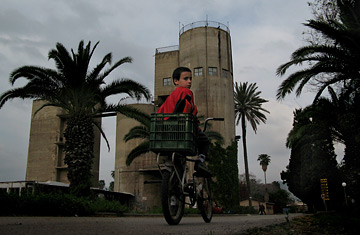
A child passes by on the road leading to the main entrance of the Kibbutz Degania Aleph in Israel.
When Israel's oldest kibbutz, Degania, announced that it was giving up its socialist ideals and going private--members could own homes and earn salaries based on how hard they worked--few other than the kibbutzniks themselves were happy. For many Israelis, Degania was a symbol of rosier days, a Zionist idyll of honest work and camaraderie. But for those who called it home, the kibbutz had become an anachronism as rusty as the battered farm tools on display for tourists. Today, the younger generation of kibbutzniks pines for individualism. Tamara Gal-Sarai gazes out over the kibbutz lawn until her eyes settle on the blue-white shimmer of the Sea of Galilee. "The Israeli press blames us for killing their utopia," she says. "It was as if we'd destroyed a national treasure."
That treasure was Israel's self-image. After independence in 1948, the kibbutzniks were seen as the new breed of Israeli. They discarded Europe's deathly pallor and became bronzed, idealistic pioneers. Degania, which had been founded in 1910 by 12 Jews escaping Russian persecution, was the ideal. Its members were beset by malaria, cattle thieves and bouts of self-doubt. Yet they greened the stony hills with citrus groves. At night in the communal dining hall they argued passionately over the grand themes of the late 20th century: the individual vs. the group, women's rights, capitalism vs. socialism, religion. (It wasn't until last year that the kibbutzniks of Degania, ardent Zionists, voted to build a synagogue.)
Only 1.7% of Israelis live on kibbutzim, but their influence pervades life and culture. For years, kibbutzniks were the nation's heroes. Moshe Dayan, Defense Minister during the Six-Day War, was born in Degania, and many military leaders and legislators also emerged from the kibbutzim. The kibbutz was a socialist dream. But Degania's manager, Tzali Koperstein, says, "From the start, it was never equal. It was a fake equality." Some toiled hard in Degania's diamond-cutting tool factory and in the fields; others slacked off. And as Israeli society began to value creativity and free enterprise over socialism, Degania lagged behind.
Once, everyone earned the same wage, did the jobs they were assigned, and kibbutz elders held the purse strings. Now, says Degania's manager, "we are still protecting the weak, but everyone has the responsibility of earning their own living." Some naive kibbutzniks, he says, need to be taught how to open a bank account and use an ATM card. Elders learned a lesson in capitalism that any kid with a lemonade stand could have taught them: the individual works harder for himself than for the collective. Factory output has jumped.
The kibbutz's experiment failed for other reasons. Israeli youth felt stifled and left. "Kibbutz life is peaceful and rich," says Koperstein. "But it came at a high price. You gave up individual needs. The idea of having someone telling you what to think, what to study, what work to do--it's like having four walls closing you in." In some kibbutzim (not Degania), children were separated from parents and raised in collective dormitories. Says Gal-Sarai: "Kibbutzniks from the other places are bringing good business to Tel Aviv's shrinks." Koperstein, who was not raised at Degania, recalls the time when, at age 7, he woke from a nightmare in the dorm and ran home through the darkness to be comforted by his parents. "At 3 a.m., the wardens came knocking on the door to bring me back. I couldn't raise my kids that way," he says.
Degania's elders don't consider the departure from socialism a failure. "Many Israelis see us as yet another broken symbol," says the kibbutz manager. "But we don't feel that. For us, it's an evolution. We had to change."
